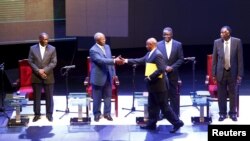Six Ugandan presidential candidates waited for several minutes after being introduced at Saturday evening's debate before President Yoweri Museveni appeared belatedly on stage.
Because Museveni has never participated in such a debate during his 30 years in office, the moment was historic.
The president offered an explanation as to why he missed a previous debate in January.
"Thank you very much for organizing this debate,” he said. “The other time I did not come because I was far away."
The eight candidates — the last one appeared later in the event — focused on foreign policy and national security issues, while touching on other topics. Health care and education dominated the first debate.
At a Glance: Ugandan Elections
At a Glance: Ugandan Elections
- These are Uganda's third general elections since the start of multi-party politics in 2005.
- President Yoweri Museveni and his NRM party won landslide victories in the 2006 and 2011 polls. Observers said both polls were marred by irregularities and intimidation of opposition parties.
- Museveni, 71, has been president since seizing power in a 1986 coup.
- His main challengers in this year's vote, longtime opposition leader Kizza Besigye and former prime minister Amama Mbabazi, have seen election rallies broken up by police during the campaign.
- Top issues this year include chronically high unemployment, corruption and Uganda's international role. At the final presidential debate, candidates discussed whether the country should continue sending troops to conflict areas like Somalia, and whether it should pull out of the International Criminal Court.
- 15 million Ugandans are registered to vote in the polls.
This time around, candidates gave their positions on topics such as whether Uganda should continue sending troops to conflict zones like Somalia and South Sudan; how the country can best fight terrorism threats; if it should withdraw from the International Criminal Court; and how best to improve the economy.
Museveni — with the ruling NRM party — was joined on stage by Kizza Besigye, the longtime leader of the opposition Forum for Democratic Change, and Amama Mbabazi, a former prime minister to the president who is running as an independent, as well as five other candidates.
Besigye has run against Museveni three times before, losing each time amid accusations that the president's supporters rigged the vote and intimidated his opponents.
In the debate, the 71-year-old Museveni briefly addressed one of the biggest concerns about his presidency.
"Finally, about democracy, democracy means that people support you,” he said. “If they don't support you, you don't win. That's all."
Businessman Edward Luwemba, who attended the debate, said Ugandans benefit from hearing the views of all the candidates.
"Look, they want to make informed decisions, on reason and logic. Not just a matter of ‘I love so and so,' but they want to know what someone is going to offer them," he said.
Ugandans head to the polls Thursday.




